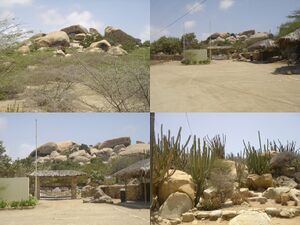Earth:Ayo Rock Formations
Ayo Rock Formations are monolithic rock boulders located on the island of Aruba in the Caribbean. They are located near Ayo village, about 3.2 km from the natural bridge towards Casibari. Casibari Boulders are about 3.2 km inland between Natural Bridge (now defunct) and Oranjestad, the capital of Aruba, west of Boca Andicuri.[1][2][3]
History
The Arawak people were the earliest settlers on the island. They used to visit Ayo Rock Formations so that they could hear incoming thunderstorms closing in on the island of Aruba. They also carved paintings in rocks called petroglyphs while performing religious rites.[2][3][4]
Formations
One of the unusual and notable rock formations is the Casibari Boulders, which are tonalite rocks seen to the north of Hooiberg. They are reddish brown in colour and rise above the desert landscape giving a panoramic view of the island. They are located amidst cacti, and lizards are commonly encountered here. The boulders have unusual shapes resembling birds and dragons. There is no plausible explanation yet for the presence of these unusual wind-carved boulder formations on a flat sandy island.[2][3][4] However, the geological formations seen on the island are of volcanic origin in its eastern sector, and some areas which are of coral formation are ascribed to the sea which was at higher level. However, in the diorite rock formation region, the Ayo Rock Formations are seen in a heap of monolithic boulders.[5]
Walking trails
Walking trails and steps have been set around the formation. They pass through several narrow tunnel which make the access through a single line quite difficult. Casibari formations are approached 3.2 km from the Highway 4A/B.[3][4][6] At the entrance, there is a formation named Dragon Mouth. On a clear day, the entire island and even Venezuela coast line can be seen from the formations site.[1]
References
- ↑ 1.0 1.1 Joyce Huber; Jon Huber (2006). Best Dives of the Caribbean. Hunter Publishing, Inc. p. 43. ISBN 978-1-58843-585-9. https://books.google.com/books?id=VPdS7c4uiNYC&pg=PA43.
- ↑ 2.0 2.1 2.2 Christina Paulette Colón (2009). Frommer's Portable Aruba, Bonaire, and Curacao. Frommer's. p. 104. ISBN 978-0-470-49737-1. https://books.google.com/books?id=IQDYlBZwQn0C&pg=PA104.
- ↑ 3.0 3.1 3.2 3.3 Lynne M. Sullivan (2009). Aruba. Hunter Publishing, Inc. p. 29. ISBN 978-1-58843-727-3. https://books.google.com/books?id=eYCC-NLPDR4C&pg=PT29. Retrieved 5 January 2011.
- ↑ 4.0 4.1 4.2 "Rock Formations". Aruba.com. Archived from the original on 10 January 2011. https://web.archive.org/web/20110110062917/http://www.aruba.com/ThingstoDo/attractions/Rock_Formations.aspx. Retrieved 1 January 2011.
- ↑ Hans W. Hannau (May 1975). The Netherlands Antilles in full color: Curaçao, Aruba, Bonaire, St. Maarten, Saba, St. Eustatius. Hastings House. https://books.google.com/books?id=5EhsAAAAMAAJ.
- ↑ "Casibari Rock Formations". Welcome Aruba.com. http://www.welcomearuba.com/casibari-rock-formations.html. Retrieved 6 January 2011.
External links
- Ayo Rock Formations – aruba.com





